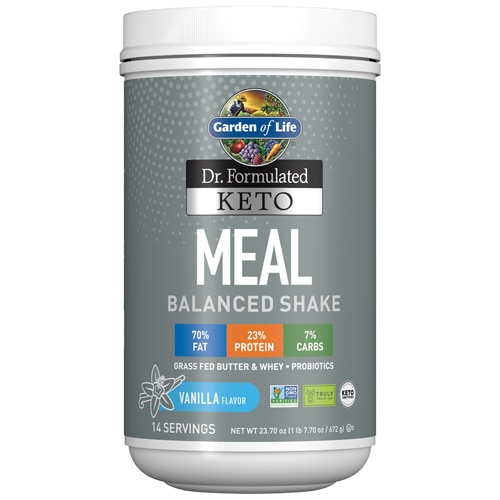You’re past the point of learning how to start a ketogenic diet. You’re following a high-fat, moderate-protein and low-carbohydrate eating plan and even have a keto recipe book at the ready. But what you probably haven’t considered is a supplement routine.
While a daily multivitamin is a great start, there’s a lot more you can do to support your weight loss or fitness performance – not to mention, your overall health. Taking certain supplements on the keto diet can actually help you achieve ketosis, support digestion and fill in any nutritional gaps along the way.
Still not convinced? Below are the 10 best supplements for keto diet success and why you might need them. Of course, you may not need – or even want – to take all of these nutrients. Each and every body is different, which is why you should consult your primary healthcare professional before following a new diet or nutrition program.
If you’ve been keto for a little while now, this would be a good time to assess your nutrient levels. Based on the results of a simple blood test, you can determine the right way to supplement your keto diet.
The 10 Best Supplements for Keto Diet Success
To make it easy, we’ve broken down the best supplements based on how they support your body on the ketogenic diet. Whether you want help reaching ketosis or need to increase your nutrient intake, these are the supplements to consider.
To achieve ketosis…
Exogenous ketones
Exogenous ketones are ketones sourced outside the body (exo = outside). Put another way, these are the supplemental form of ketones. They can help stimulate ketosis for someone already following a strict ketogenic diet.†
Typically, exogenous ketones are formulated from beta-hydroxybutyrate, or BHB. You can find these supplements in powder or capsule form. Some BHB capsules have caffeine, making them a great pre-workout supplement. Others, are a flavored powder that punches up plain water. Exogenous ketones in powder form can also be used 30 minutes before you exercise or during a fasting period in place of your first meal.
MCT oil
MCT stands for medium-chain triglycerides, which are often derived from coconuts. For years, there’s been talk of how coconut oil benefits athletes’ performance and how it may aid in weight loss. These proposed benefits are due to coconut oil’s concentration of medium-chain triglycerides, or MCTs.
MCTs are a type of healthy fat, just like the long-chain fatty acids you get from olive oil. What makes MCTs so unique is the fact that they are quickly metabolized by the body and used for energy. A study from the University of British Columbia suggests that the energy produced by MCTs comes in the form of ketone bodies. Therefore, supplementing with MCT oil can raise your level of ketone bodies and kickstart ketosis.
Whether you’re at the start of your keto diet or already several months in, it might be worthwhile to try a spoonful of liquid MCT oil. Many people swallow it straight, but you can always add it to your morning coffee or smoothie for a nice boost at the beginning of your day. If the hint of coconut doesn’t appeal to you, MCT oil capsules are an odorless, flavorless alternative.
To support digestion…
Digestive enzymes
At the beginning of your keto diet journey, you’ll experience several signs of ketosis. Some of these are welcomed changes, such as weight loss. But it’s also common to have an upset stomach. Consuming high amounts of fat can be taxing on your digestive system, especially at the onset. Enter: digestive enzymes.
In fact, digestive enzymes are some of the best supplements for keto diet followers. As long as you’re following this high-fat eating plan, you’ll want to take a fat-targeted digestive enzyme. That means look for a formula that features lipase, the enzyme that breaks down dietary fat into fatty acids that can be absorbed and used by the body.
Probiotics
Probiotics are beneficial bacteria that live in your digestive system. (Yes, there are distinct differences between digestive enzymes vs. probiotics). These “friendly” microorganisms do a good job of regulating themselves. However, there are times when your gut goes out of whack. This usually happens when you’re experiencing a lot of stress, but your microbiome can also fluctuate due to changes in your diet – even if they are healthy changes.
As your body adapts to the high-fat, low-carb keto diet, taking a probiotic supplement can help support digestion and a healthy immune response. Just be sure your supplement offers a wide range of bacterial strains to help maintain a good mix of microflora.†
Fiber
It may be a stinky subject, but one of fiber’s greatest functions is its ability to add bulk to your stool. This allows for healthy and regular bowel movements, which is as good for your colon as it is your skinny jeans. The only problem is that many people have a hard time getting the recommended 25-to-38 grams of fiber every day. This is especially true if you restrict whole grains and fiber-rich fruits from your diet.
Luckily, there are some keto-friendly fiber foods, such as broccoli and cauliflower. Of course, you can’t survive on cruciferous vegetables forever. So you’ll probably want to add a fiber supplement to the mix. You’ll get the most bang for your buck if you choose a multi-fiber complex, featuring both soluble and insoluble fiber.
To help with nutrient balance…
Magnesium
Magnesium is a mineral that takes part in more than 300 biochemical processes in the human body. From muscle contraction to healthy blood pressure, magnesium is a critically important nutrient.† Yet, somehow, 50% of Americans do not meet the recommended magnesium intake levels. For keto dieters, magnesium can be especially difficult to get from food alone. The best food sources are green leafy vegetables and whole grains. By limiting grains in your diet, you may also be limiting your magnesium consumption.
You can try to make up for it with spinach salads and pumpkin seed snack bars. But if you’re really concerned about your levels, take a magnesium supplement after your first meal of the day. The average adult needs 310 to 420 milligrams of magnesium per day, so look for a formula that can help you meet those Recommended Dietary Allowances (RDAs).
Electrolyte supplements
In addition to magnesium, your body may benefit from a full range of electrolytes. Other electrolytes found in your blood, sweat and urine include calcium, chloride, phosphorous, potassium and sodium. These minerals carry a positive or negative electric charge, which affects your body in a number of ways. Getting the right sources of electrolytes – and the right mix – influences your body’s water level, blood pH, muscle contraction and nervous system function, to name a few.
You know now that keto dieters can struggle with magnesium intake, but that’s not the only electrolyte affected by your new eating habits. Studies suggest that when insulin is low (such as when you’re consuming very few carbs), your kidneys absorb less sodium, which allows more of the nutrient to escape through the urine. This creates a domino effect. As your body loses sodium, your kidneys scamper to excrete more potassium to maintain a healthy balance.
To keep up with demand, you can add salt when you’re sautéing veggies or sip on keto-friendly beef bone broth. For more comprehensive support, consider an electrolyte supplement. Irwin Naturals Coconut Oil MCT Energy & Electrolytes supplies magnesium, chloride, sodium and potassium all in one easy-to-take softgel.
Vitamin D
Vitamin D is an essential nutrient for bone formation, calcium absorption and maintaining healthy levels of phosphorous (an important electrolyte). The body makes more vitamin D when skin is exposed to direct sunlight, though you can also get a sufficient supply through certain food sources. Some of the most vitamin D-concentrated foods include fatty fish, whole milk and fortified cereals or orange juice.†
Clearly, OJ and cereal are off-limits for keto dieters. But if you have a fish allergy or prefer a more plant-based keto diet meal plan, you’d be wise to supplement. Vitamin D3, or cholecalciferol, is the same form of vitamin D that your body produces when exposed to UV sunlight. So when it comes to supporting your nutrient levels, stick with a vitamin D3 supplement.
To support overall well-being…
Turmeric
There are several keto diet benefits. One of the more recent discoveries published online noted that “the ketogenic diet performs anti-inflammatory activity.” However, some people are still predisposed to inflammation throughout the body. In these cases, supporting your body with turmeric may help. After all, turmeric is known to help maintain a healthy inflammatory response.
The active ingredient in turmeric that’s responsible for its great health properties is curcumin. Curcumin is composed of powerful phytonutrients known as curcuminoids. You can enjoy curcumin as a spice sprinkled on your food, dried and steeped as tea or in supplement form. When choosing a turmeric supplement, look for a standardized formula, so you know you’re getting the active ingredient.
Ashwagandha
Ashwagandha is an adaptogenic herb that’s been used in Ayurvedic medicine for centuries. It can help the body adapt during difficult times. The patented KSM-66® ashwagandha root extract, for instance, has been shown to support a sense of calm and well-being. As you can imagine, these health-promoting properties can be especially useful when you’re making sudden and extreme changes to your diet.†
With regards to supplementing, ashwagandha is usually found in its root extract form. Its active compounds include alkaloids and lactones, which are among a class called withanolides. Like turmeric, you want your ashwagandha supplement to be standardized to the active compounds. This will ensure you get a consistent formula in each serving.
†These statements have not been evaluated by the Food and Drug Administration. These products are not intended to diagnose, treat, cure or prevent any disease.




